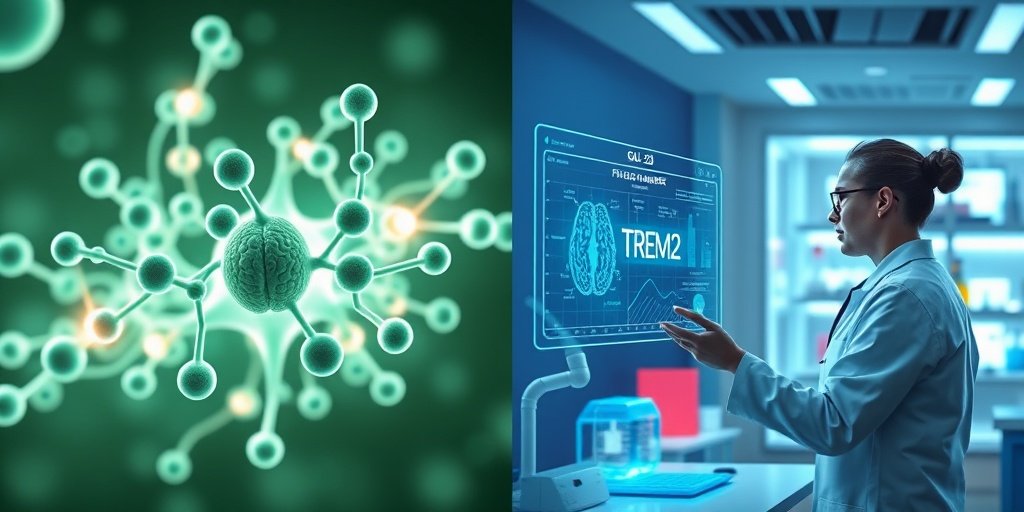⚡ Quick Summary
This study highlights the discovery of FJMU1887, a novel brain-penetrant Galectin-3 inhibitor, utilizing an AI-driven drug discovery platform for potential Alzheimer’s disease therapy. The compound demonstrated significant anti-neuroinflammatory effects and improved cognitive performance in mouse models.
🔍 Key Details
- 🧬 Target: Galectin-3 (Gal-3)
- 💻 Technology: AI-driven drug discovery platform
- 🔬 In vitro binding affinity: Kd of 1.55μM
- 💊 Inhibitory concentration (IC₅₀): 2.36 ± 0.37μM for TNF-α
- 📈 In vivo results: 30-day oral administration in 5×FAD mice
🔑 Key Takeaways
- 🧠 Galectin-3 is a critical regulator of neuroinflammation and a promising target for Alzheimer’s therapy.
- 🤖 AI technology facilitated the identification of FJMU1887 as a potent Gal-3 inhibitor.
- 💡 FJMU1887 showed effective blood-brain barrier penetration and favorable pharmacokinetic properties.
- 📉 In vitro studies demonstrated suppression of inflammatory responses without cytotoxicity.
- 🌟 In vivo studies indicated reduced Gal-3 expression and improved cognitive performance in mouse models.
- 🔗 Mechanistic studies revealed disruption of the Gal-3-TREM2 interaction.
- 📊 FJMU1887 represents a promising lead compound for Alzheimer’s disease therapy.

📚 Background
Alzheimer’s disease (AD) is a complex neurodegenerative disorder characterized by progressive cognitive decline and neuroinflammation. Galectin-3 has emerged as a key player in the inflammatory processes associated with AD, making it a compelling target for therapeutic intervention. However, the challenge lies in developing small-molecule inhibitors that can effectively penetrate the blood-brain barrier (BBB) to exert their effects.
🗒️ Study
The research team employed an AI-driven drug discovery platform to identify potential Gal-3 inhibitors. Through virtual screening and structure prioritization, they discovered FJMU1887, which was further evaluated for its pharmacokinetic properties and ability to penetrate the BBB. The study included both in vitro and in vivo assessments to determine the compound’s efficacy and safety.
📈 Results
FJMU1887 exhibited a binding affinity of 1.55μM to Gal-3 and effectively inhibited TNF-α production with an IC₅₀ of 2.36 ± 0.37μM. In vivo, the compound significantly reduced Gal-3 expression and microglial activation in 5×FAD mice, leading to decreased amyloid-β burden and restored synaptic integrity. Notably, cognitive performance improved across multiple behavioral paradigms.
🌍 Impact and Implications
The findings from this study could pave the way for new therapeutic strategies targeting neuroinflammation in Alzheimer’s disease. By leveraging AI technology, researchers can expedite the discovery of effective treatments that not only address the underlying inflammation but also enhance cognitive function. This dual approach may significantly improve the quality of life for individuals affected by AD.
🔮 Conclusion
The discovery of FJMU1887 as a brain-penetrant Galectin-3 inhibitor underscores the potential of AI-driven drug discovery in developing innovative therapies for Alzheimer’s disease. With its promising pharmacological profile and cognitive benefits, FJMU1887 represents a significant step forward in the quest for effective AD treatments. Continued research in this area is essential to fully realize the therapeutic potential of such compounds.
💬 Your comments
What are your thoughts on the use of AI in drug discovery for Alzheimer’s disease? We would love to hear your insights! 💬 Leave your comments below or connect with us on social media:
AI-Driven Discovery of Brain-Penetrant Galectin-3 Inhibitors for Alzheimer’s Disease Therapy.
Abstract
Galectin-3 (Gal-3) has emerged as a critical regulator of neuroinflammation and a promising therapeutic target for Alzheimer’s disease (AD). Nevertheless, the development of brain-penetrant small-molecule Gal-3 inhibitors poses a significant challenge. To address this, we employed an artificial intelligence (AI)-driven drug discovery platform, identifying FJMU1887 as a novel Gal-3 inhibitor possessing optimized pharmacokinetic properties and favorable blood-brain barrier (BBB) permeability. Following AI-based virtual screening and structure prioritization, FJMU1887 demonstrated direct binding to Gal-3 with an affinity (Kd) of 1.55μM, determined by microscale thermophoresis (MST). Crucially, mechanistic studies revealed that FJMU1887 disrupts the Gal-3-TREM2 interaction, as evidenced by fluorescence resonance energy transfer (FRET) and fluorescence correlation spectroscopy (FCS) assays. In vitro, FJMU1887 suppressed inflammatory responses in BV-2 microglial cells, inhibiting TNF-α with an IC₅₀ of 2.36 ± 0.37μM, without inducing cytotoxicity. Pharmacokinetic assessments via parallel artificial membrane permeability assay for BBB (PAMPA-BBB) and in situ brain perfusion revealed effective blood-brain barrier penetration by FJMU1887, though partial P-glycoprotein-mediated efflux was observed. In vivo, 30-day oral administration of FJMU1887 to 14-month-old 5×FAD mice significantly reduced Gal-3 expression, attenuated microglial activation and neuroinflammation, decreased amyloid-β burden, and restored synaptic integrity. Notably, FJMU1887 improved cognitive performance in both 5×FAD and oligomeric Aβ-induced cognitive impairment mouse models across multiple behavioral paradigms. Collectively, FJMU1887 represents a brain-penetrant small-molecule Gal-3 inhibitor with dual anti-neuroinflammatory and cognition-enhancing effects, establishing it as a promising lead compound for AD therapy.
Author: [‘Liu X’, ‘Xu J’, ‘Zheng S’, ‘Yang Y’, ‘Xie Y’, ‘Liu J’, ‘Zhong J’, ‘Zhang H’, ‘Chen J’, ‘Dai C’, ‘Wang D’, ‘Luo J’, ‘Chen X’, ‘Zhong F’, ‘Ye ZC’]
Journal: Pharmacol Res
Citation: Liu X, et al. AI-Driven Discovery of Brain-Penetrant Galectin-3 Inhibitors for Alzheimer’s Disease Therapy. AI-Driven Discovery of Brain-Penetrant Galectin-3 Inhibitors for Alzheimer’s Disease Therapy. 2025; (unknown volume):107834. doi: 10.1016/j.phrs.2025.107834